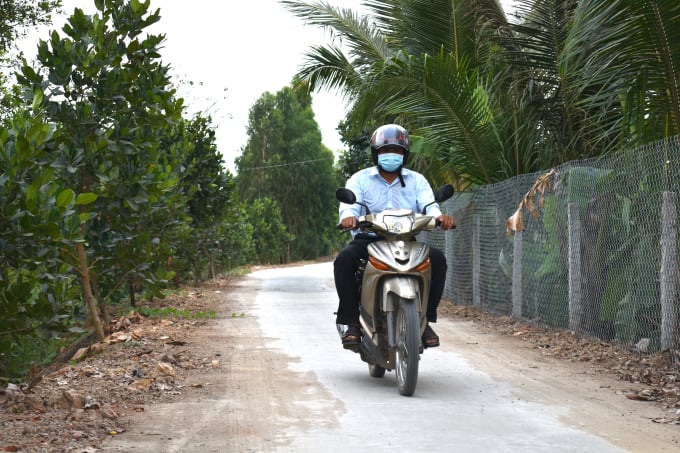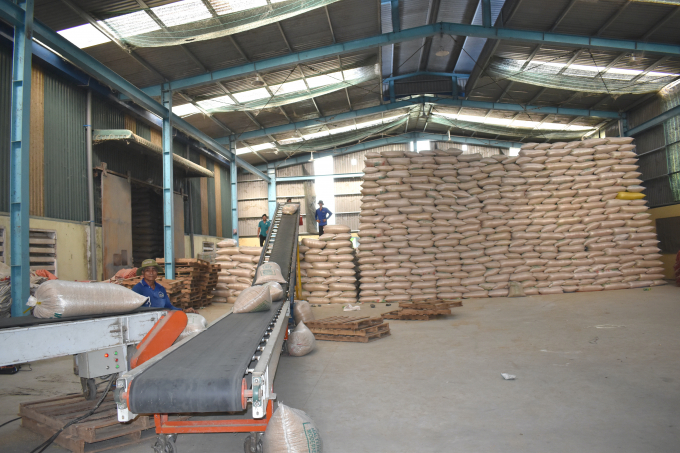November 27, 2025 | 21:06 GMT +7
November 27, 2025 | 21:06 GMT +7
Hotline: 0913.378.918
November 27, 2025 | 21:06 GMT +7
Hotline: 0913.378.918

Farmers in the VnSAT project area in Tien Giang province prepare to sow the spring-summer crop. Photo: Minh Dam.
The Vietnam Sustainable Agriculture Transformation project has aided Mekong Delta regions in transferring technological and scientific advances in rice cultivation, as well as investment in production infrastructure. The project achieved some beneficial effects; nearly all localities met or exceeded their set targets. The VnSAT project has generated positive public sentiment both inside and outside the project region.
However, to have a beneficial effect on the community, the initiative originally experienced several hurdles. Local government at the grassroots level serves as a critical focal point for coordination with functional sectors and Project Management Boards at all levels to overcome these hurdles.
Rice is cultivated on 2,700 hectares in Tan Lap commune, Tan Thanh district, Long An province. Since the course training three reduce three increase and one must five decrease techniques were introduced to promote farmer awareness, the transformation is visible. Farmers now prioritize profit above output. Farmers are now more interested in verified seeds; the seed sown per 1,000m2 has fallen from 20kg to 12-16kg for hand planting and 10kg for row sowing.

Road built by VnSAT project supports people in Nhon Hoa Lap commune, Tan Thanh district, Long An province. Photo: Minh Dam.
Mr. Nguyen Manh Cuong, Deputy Chairman of the Tan Lap Communal People's Committee, explained that the project's implementation was initially difficult, as farmers struggled to shift from conventional agriculture to modern technology methods. The commune collaborated with trainers to continually offer training sessions. Despite a small number of attendance or issues with the training path, the courses were conducted regularly to progressively reach out to farmers. Create sample models for individuals to compare and evaluate the efficacy of new scientific and technological developments in transforming manufacturing operations. Farmers are now enthused to participate in professional training sessions.
When it comes to infrastructure investment projects, people are delighted when the works benefit manufacturing and tourism. However, there was originally an issue with ground clearance. After being convinced of the project's success by the local community, residents willingly contributed lands to establish the necessary circumstances for the works to be completed on time.
Local constructions invested in and implemented in Tien Giang province have had some favorable results. Mr. Le Van Teo, Director of My Trinh Agricultural Service Cooperative in Hay My Trinh commune, Cai Be district, Tien Giang province, shared that the cooperative is supported by a warehouse to preserve rice in addition to models for transferring scientific and technical advances such as three decrease, three increase, and one must five decreases.
Additionally, the initiative assists the community in developing rural roads to suit the transportation needs of local farmers and neighboring communes for agricultural goods, particularly rice. To conclude, the public is eager to benefit from the project's effectiveness. As the formerly deteriorating and muddy road was changed into a smooth road leading to the field, it now provides a more convenient way of transportation.

Rice warehouse built by VnSAT project supports My Trinh Agricultural Service Cooperative in Hau My Trinh Commune, Cai Be District, Tien Giang Province. Photo: Minh Dam.
According to the VnSAT Tien Giang Project Management Board, the unit collaborated with local governments to develop a list of investment infrastructure projects in cooperatives that satisfied World Bank and Vietnamese government training standards and followed prescribed investment procedures. Tien Giang has so far invested in 20 sub-projects and one main project, including the following: upgrading 27 rural roads with asphalt and concrete paved structures totaling nearly 74 kilometers; 36 traffic bridges; 30 regulating culverts and combined culverts with pumping stations; 7 temporary warehouses; and 1 tower drying oven.
Additionally, the World Bank has organized several training courses in project management, financial management, monitoring and evaluation, procurement and bidding, the environment and society, and communication in collaboration with the Ministry of Agriculture and Rural Development. Thus, to strengthen the ability of authorities responsible for the project's execution, as well as officials and public employees in the agricultural sector, to manage and implement ODA projects.
This favorable outcome emerged throughout the Project's execution, which drew the attention and assistance of specialists from the World Bank, the Ministry of Agriculture and Rural Development, the Central Project Management Board, and other authorities. Particular attention should be paid to the assistance and facilitation provided by authorities at all levels, from province to district and commune, with the agreement and active participation of farmers and companies. From a historical perspective, the attained outcomes have made a significant contribution to the sustainability of rice cultivation.
Translated by Linh Linh

(VAN) According to Mr. Vo Minh Thanh, Director of the Tay Ninh Department of Agriculture and Environment, Resolution 57 has created a new development pathway for the locality, shifting from traditional toward modern agriculture.
/2025/11/26/4909-2-154329_878.jpg)
(VAN) Pearl grouper farming in HDPE cages not only delivers economic efficiency but also contributes to protecting the environment, creating jobs, and promoting marine-based experiential tourism.

(VAN) The model of making a living under the forest canopy through the agroforestry system in Van Son commune, Bac Ninh province, is expected to generate an annual income of approximately VND 30 million/ha.

(VAN) Many enterprises in Can Tho are harnessing natural energy and reducing greenhouse gas emissions in their production processes, thereby contributing to the promotion of a sustainable green transition.
/2025/11/24/3536-2-112800_176.jpg)
(VAN) Dong Nai now has tens of thousands of hectares of forests certified for sustainable management, and this area will continue to be expanded in the coming period.

(VAN) Vinh Ha hamlet (Dai Xuyen commune, Hanoi) is shifting away from small-scale farming as households adopt bioscurity into their breeder chicken models.

(VAN) Heavy rains make aquatic species more vulnerable to disease. Proactive water management and high-tech systems help farmers prevent outbreaks and protect yields.